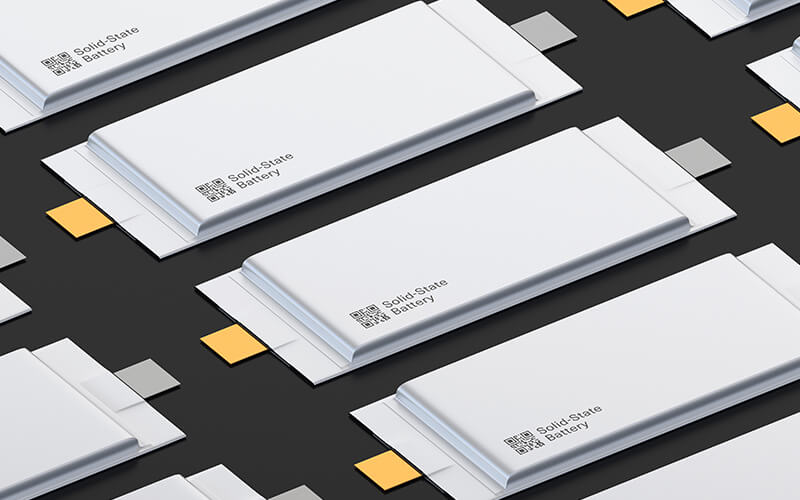Solid-State Batteries Promise to Stretch EV Range
09/03/2024 //

Ground zero in the war to win the hearts and minds of electric vehicle (EV) drivers today is range as market demand focuses on energy efficient products that maximize battery life. To win this battle, tech companies, traditionally conservative when it comes to innovations that are challenging to their operational status quo, seem to be prepared to introduce radical new solid-state, high energy density battery formulations.
EVs, in general, use one of two types of batteries – LFP or NMC. LFP batteries are composed of lithium iron phosphate, while NMC is composed of nickel manganese cobalt (NiMnCo). A solid-state battery is an electrical battery that uses a solid electrolyte for ionic conductions between the electrodes, instead of the liquid or gel polymer electrolytes found in conventional batteries. Solid-state batteries theoretically offer much higher energy density than the typical lithium-ion or lithium polymer batteries.
Lithium batteries with solid-state electrolytes also are an appealing alternative to state-of-the-art non-aqueous lithium-ion batteries with liquid electrolytes because of safety aspects. Batteries containing liquid electrolytes are subject to spillage corrosion at the electrode plus the fact that they are highly flammable and will trigger thermal runaway, fire and even explosion under conditions of mechanical, electrical and/or thermal abuse. The increasing use of solid-state batteries in electric vehicles is expected to open new market expansion opportunities in upcoming years.
Fast Charge in 9 Minutes
Still, solid-state batteries have been held back by cost, manufacturing challenges and a tendency to short circuit. After decades of research, however, solid-state batteries seem ready to finally deliver on their promise.
At SNE Research’s Battery Day 2024 event, Samsung SDI stole the show with the announcement of a groundbreaking energy density battery capable of 500 watt-hours (Wh) per kilogram (kg), roughly double what a regular EV battery is rated for. Samsung's design specifically employs a solid sulfide electrolyte, which is known for its high ionic conductivity and stability.
What’s more, Samsung’s battery technology encompasses very long life – claimed by the brand to be as much as 20 years – as well as fast charging; from 8% to 80% in just 9 minutes. Samsung’s 9-minute charging boast refers to the standard metric of charging a battery from 10% or 20% to 80% capacity rather than a full charge from 0% to 100%. This practice is common in the industry as charging speeds typically slow down significantly beyond the 80% mark to protect battery health and longevity.
Samsung further revealed that its pilot solid-state EV battery production line is now fully operational. The company built a pilot line last year to mass-produce all-solid-state batteries by 2027.
In June, TDK announced that it had developed a new version of its CeraCharge solid-state battery that has an energy density of 1,000 watt-hours per liter — 100 times greater than its existing CeraCharge battery.
Utilizing proprietary technology, TDK has developed a material for a new solid-state battery with a significantly higher energy density than TDK’s conventional mass-produced CeraCharge solid-state batteries due to the use of an oxide-based solid electrolyte and lithium alloy anodes with an energy density of 1,000 Wh/L, approximately 100 times greater than the energy density of TDK’s conventional solid-state battery. The use of an oxide-based solid electrolyte also should make these batteries extremely safe. Initially, TDK envisions the new CeraCharge battery being used in wireless headphones, hearing aids and smartwatches, but it could eventually be scaled up for use in larger devices, such as smartphones.
TDK will strive to develop the battery cells and package structure design and advance toward mass production, targeting the development of its new solid-state battery. Moreover, TDK aims to enhance the capacity of the batteries through multi-layer lamination technology and expand its operating temperature range by applying the production engineering technology TDK has accumulated in the electronic components business.
800 Cycles
ION Storage Systems, a Maryland-based manufacturer of high energy density, fast charging solid-state batteries has achieved 800 cycles in its solid-state battery cells without compression or volume change, traditionally a major impediment to solid-state battery adoption.
This news comes on the heels of the company's announcements in early 2024 that ION's is the first anodeless solid-state battery to achieve 125 cycles without pressure, the commissioning of its $30 million manufacturing facility and its award of $20 million by ARPA-E for the development of SSBs for the electric vehicle industry.
According to ION its battery cycle life already meets the broad requirements for a variety of defense and public safety applications, and with this announcement, ION's battery cells are now exceeding the cycle life requirements for the over $24 billion consumer electronics battery market inclusive of devices from IoT and wearables to mobile phones and laptops.
Born out of the University of Maryland's incubator, ION's solid-state battery platform is said to be the first to achieve this milestone with an anodeless design without compression, representing a key step for ION's goal of releasing its first-generation product in late 2024 to commercial customers.
ION's patented solid-state anodeless technology provides an alternative to traditional lithium-ion batteries and eliminates the need for less sustainable materials such as graphite with the use of a 3-D ceramic structure. ION's solid-state battery also requires no extensive cooling system or heavy fire barriers. ION's drop-in replacement design for Li-Ion batteries can accelerate the adoption of ION's solid-state battery in applications including consumer electronics, medical devices, electric vehicles, grid storage and aerospace and defense.
Last year, Idemitsu Kosan Co.Ltd. (Idemitsu) and Toyota Motor Corporation announced that they have entered into an agreement to work together in developing mass production technology of solid electrolytes, improving productivity and establishing a supply chain to achieve the mass production of all-solid-state batteries for battery electric vehicles (BEVs). This collaboration focuses on sulfide solid electrolytes, which are seen as a promising material to achieve high capacity and output for BEVs. Sulfide solid electrolytes are characterized by softness and adhesiveness to other materials, which is suitable for battery mass production.
Through this collaboration, the two companies seek to ensure the successful commercialization of all-solid-state batteries in 2027-28, followed by full-scale mass production.
Follow TTI, Inc. on LinkedIn for more news and market insights.
Statements of fact and opinions expressed in posts by contributors are the responsibility of the authors alone and do not imply an opinion of the officers or the representatives of TTI, Inc. or the TTI Family of Specialists.
Follow TTI, Inc. - Europe on LinkedIn for more news and market insights.
Statements of fact and opinions expressed in posts by contributors are the responsibility of the authors alone and do not imply an opinion of the officers or the representatives of TTI, Inc. or the TTI Family of Specialists.
Murray Slovick

Murray Slovick is Editorial Director of Intelligent TechContent, an editorial services company that produces technical articles, white papers and social media posts for clients in the semiconductor/electronic design industry. Trained as an engineer, he has more than 20 years of experience as chief editor of award-winning publications covering various aspects of consumer electronics and semiconductor technology. He previously was Editorial Director at Hearst Business Media where he was responsible for the online and print content of Electronic Products, among other properties in the U.S. and China. He has also served as Executive Editor at CMP’s eeProductCenter and spent a decade as editor-in-chief of the IEEE flagship publication Spectrum.